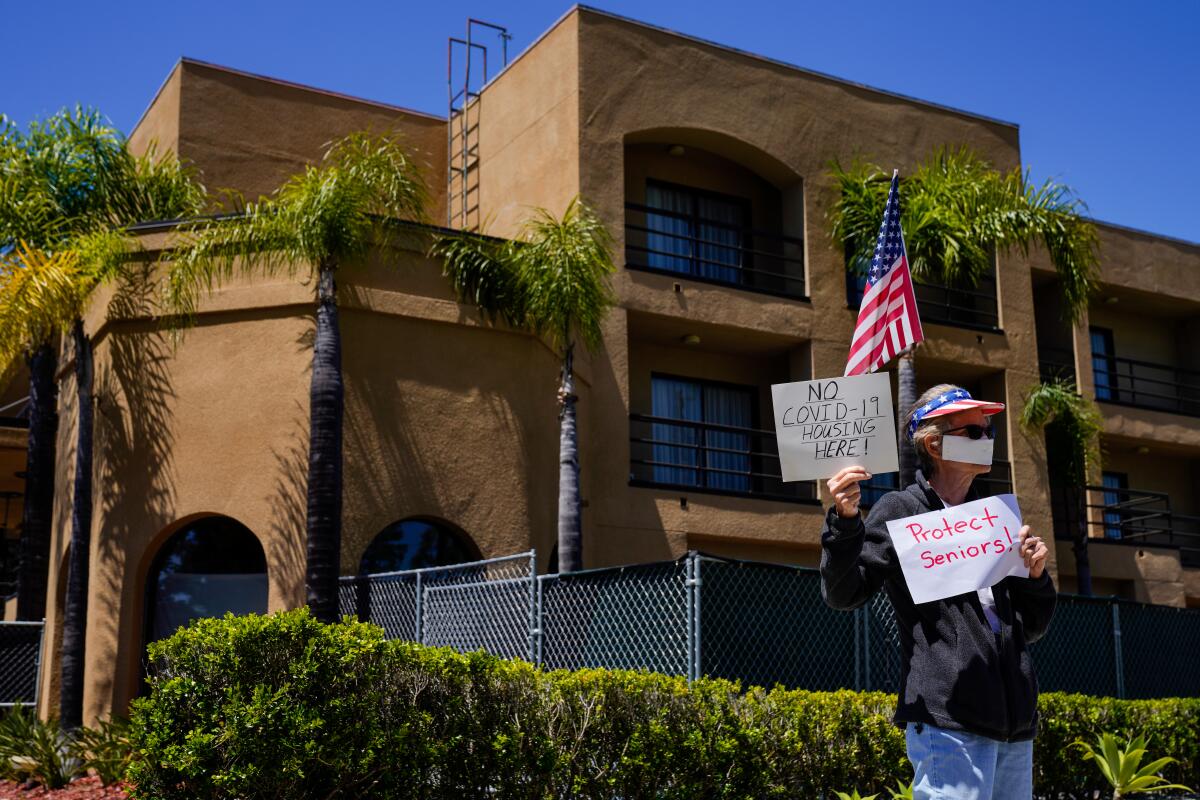Put NIMBYism under quarantine, before homeless people with conoravirus get even sicker

- Share via
It’s bad enough to be homeless and have no place to shelter when you are healthy. In south Orange County, if you’re homeless and have tested positive for COVID-19, your choices of places to go are a sidewalk or a hospital. Yet there are hotels sitting empty in the county that are willing to provide rooms to homeless people, if only the public would let them.
Instead, two communities in south Orange County have marshaled their energy and legal resources to thwart efforts by the state, the county, hotel owners and an experienced service provider to help protect sick homeless individuals from getting sicker as well as to keep them from spreading the virus to the community at large.
First, it was the residents of the retirement community, Laguna Woods Village, who effectively shut down plans to allow the nearby Ayres Hotel to house homeless people with COVID-19.
Now, it’s the city of Laguna Hills and several property owners who have sued Orange County to stop its plan to use the Laguna Hills Inn to house and isolate homeless individuals who have tested positive or are suspected of being positive. The city is asking for a temporary restraining order to block the initiative. At a court hearing conducted via teleconference Thursday, Kelly Richardson, an attorney representing the city of Laguna Hills, balked at the county calling this “a NIMBY (“Not In My Back Yard”) case of the worst kind” in court filings.
Richardson got that right. This is beyond NIMBYism. It’s cruelty.
Lawyers for the city of Laguna Hills argued that putting up infected homeless individuals was a danger to the public health of the community. Neither the county nor the Illumination Foundation, the service organization that’s set to oversee the care of the occupants, could guarantee that infected people wouldn’t leave the hotel and wander around the city, the lawyers argued. In other words, according to the city, the hotel is a hazard.
In fact, it’s the virus that’s the hazard. It’s hazardous — and inhumane — to let people who are homeless and sick stay on the street. And if they go to a hospital when they don’t need that level of treatment, they further strain resources the county needs to conserve. All they need is a place to isolate and recuperate.
Lawyers also argued that if all the 76 beds in the hotel were filled with COVID-19 patients, that would represent a 600% increase in coronavirus cases in Laguna Hills. There were 13 cases when they made that argument. There are now at least 14.
But that’s absurd. If that were the standard for analysis, every nearby hospital would be considered a nuisance too. Also, the county’s goal is to provide at least one hotel in different regions of the county to accommodate people who have nowhere to isolate. At the moment, the southern part of the county has none.
According to the county’s legal filings, the requirements for people isolating in the hotels are incredibly restrictive — much more so than would be tolerated in a homeless shelter during normal times. Occupants will not be allowed outside (even in the parking lot), and if they are caught violating that rule, they will be banished from the hotel and returned to wherever they came from. If they came with a car (some homeless people live in their vehicles), they must surrender their car keys. There will be security personnel on site. And the service provider’s staff has agreed not to frequent any local restaurants or stores.
These are stricter regulations than we put on COVID-19 positive individuals who live in houses and are merely cautioned to isolate and stay inside. We don’t police any of the people who tested positive and have homes in Laguna Hills or elsewhere.
Fortunately, Orange County Superior Court Judge Thomas A. Delaney didn’t see the use of the hotel as a public nuisance. He rightly saw it as a public health benefit for everyone.
However, the city has also argued that using the hotel to house sick individuals changes its use and violates the covenants, conditions and restrictions governing the property. Delaney said he’s inclined to believe that’s the case. Still, the judge won’t decide whether to issue a restraining order until after he’s heard more arguments from lawyers Monday morning.
But aren’t those regulations trumped by the state’s emergency order declaring, among other things, that hotels should be used — even commandeered — to house individuals who need isolation or quarantining? Let’s hope the judge sees it that way. We all need this hotel. And we need it yesterday.
More to Read
A cure for the common opinion
Get thought-provoking perspectives with our weekly newsletter.
You may occasionally receive promotional content from the Los Angeles Times.










